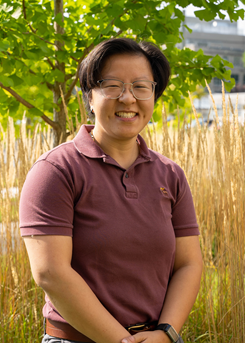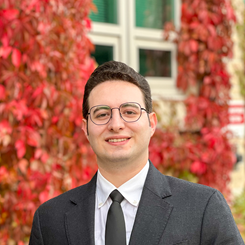Open Science Awards
What are the awards? There are 3 awards that recognize trainees who actively engage in open science practices: The Open Science Newcomer Award, The Open Science Peer Support Award, and The Open Science Trailblazer Award.
By celebrating contributions to transparency, collaboration, and accessibility, we hope to foster a culture where open science is valued and widely practiced at WIN and beyond.
Who can be nominated? Graduate students and postdoctoral fellows are eligible. They can either self-nominate or be nominated by others. A person may be nominated for more than one award, but a nominee cannot win more than one award.
Who can nominate? Peers, faculty, and staff can nominate a trainee for an award.
Nominations open: April 2, 2025
Nominations close: June 9, 2025 at 11:59 pm
Awards announced: July 2025
How to nominate? Click the "Apply here" button under the description of the relevant award.
How can I learn more? Contact WIN's Open Science Research Specialist, Christine Moreau, WINopenscience@uwo.ca.
Open Science Newcomer Award
For a trainee who has recently started applying open science methods and has shown dedication to learning and implementing these practices.
Cash Prize: $500
Eligibility
- Must be a WIN trainee (graduate student, or postdoc) who is new to open science (e.g., within the past year).
- Should have made at least one concrete effort to adopt an open science practice.
- No prior extensive experience with open science required.
Evaluation Criteria
- Initiation of Open Science Practices and Impact on Personal Research Practices (50%):
Has taken at least one significant first step, such as preregistering a study, sharing data, code, or materials on an open repository (e.g., OSF, GitHub, Zenodo), publishing in an open-access format, or participating in open hardware efforts. The nominee has made measurable changes in their research workflow to incorporate open science and can articulate how the nominee will continue or expand their adoption of open science (e.g., increased transparency, collaboration, or efficiency). - Commitment to Learning (50%):
The nominee shows a willingness to expand their open science knowledge and skills by: attending workshops, training sessions, or conferences focused on open science. The nominee actively engages with open science communities (e.g., ReproducibiliTea, Methods Lunches, or other open science initiatives). To demonstrate commitment, candidates must provide evidence of participation, such as conference proceedings, certificates, digital badges, or a short reference statement from an event organizer confirming their engagement.
Nomination and Selection Process
- Self-nomination or peer nomination. Nominations will be weighted the same whether the nomiees are self or peer nominated. Evaluation will be based on the criteria listed above.
- Application components:
- Short statement (250–500 words) describing their open science experience, what the nominee has implemented, and how it has impacted their research.
- Supporting materials such as links to preregistrations, open datasets, or contributions to open science initiatives.
- (Optional) References (max 250 words) describing how the nominee has been involved in open science initiatives.
- Review committee: The Open Science Advisory Committee will review applications and select the recipient based on the outlined criteria.
Open Science Peer Support Award
For a trainee who has gone above and beyond to help colleagues adopt open science practices. The recipient demonstrates a collaborative spirit by actively helping their peers' overcome challenges in open science and by fostering an environment of knowledge-sharing.
Cash prize: $500
Eligibility:
- Must be a WIN trainee (graduate student, or postdoc).
- Must be actively involved in open science practices.
- Should have a demonstrated history of helping others at WIN adopt open science practices (e.g., mentoring, sharing resources, leading workshops).
Evalution and Criteria
- Active Mentorship and Guidance (40%):
The nominee has actively mentored peers or junior researchers on open science practices and/or has served as a resource for troubleshooting tools and offering guidance on best practices. This can be through activities such as Method Lunches, one-to-one peer support, lab meetings, or journal club meetings. - Tangible Impact (35%):
Must provide evidence of how their support has led to tangible changes, such as more accessible data, reproducible studies, or increased adoption of open science tools/protocols. - Commitment to Inclusivity (25%):
Demonstrates an awareness of and commitment to inclusivity in open science, ensuring that resources and knowledge are accessible to everyone, including trainees and faculty.
Nomination and Selection Process
- Self-nomination or peer nomination. Nominations will be weighted the same whether they are self or peer nominated. The evaluation will be based on the criteria listed above.
- Application components:
- A statement (250-500 words) describing the nominee’s role in supporting peers and fostering a collaborative open science culture.
- Supporting materials (e.g., links to workshops, peer testimonials, examples of mentoring activities).
- (Optional) Letters of support from mentees or collaborators who have benefited from the nominee’s support (max 3 letters).
- Review committee: The Open Science Advisory Committee will review applications and select the recipient based on the outlined criteria.
Open Science Trailblazer Award
For a trainee who is pioneering new open science initiatives and making lasting contributions. This award honors individuals who have implemented open science in innovative ways, influenced others to adopt transparent research practices, and contributed to the culture shift toward openness, reproducibility, and collaboration.
Cash prize: $1000
Eligibility
- Must be a WIN trainee (graduate student, or postdoc).
- Should have a demonstrated record of implementing open science practices in their research.
- Has gone beyond personal adoption to actively lead or influence change in the broader research community.
Evaluation Criteria
- Pioneering Open Science Practices (40%):
The nominee has integrated multiple open science practices into their research workflow, such as openly sharing data, code, or materials with strong documentation, or using preregistration and open methodologies.
The nominee actively works to overcome barriers to open science adoption, such as addressing issues of data privacy, accessibility for marginalized groups, or navigating complex research environments.
The nominee actively demonstrates example(s) of initiative in overcoming challenges related to open science adoption. - Community Engagement and Influence (30%):
The nominee has actively promoted open science within their lab, department, or academic field. Has led workshops, discussions, or training sessions on open science topics.
The nominee has mentored peers or colleagues in adopting open science practices.
Indicate how the nominee's support has led to tangible changes, such as more accessible data, reproducible studies, or increased adoption of open science tools/protocols. - Impact and Contribution to Open Science Infrastructure (30%):
The nominee/nominator must provide evidence of impact (e.g., citations, downloads) of contributed work. This can include contributions to open-source tools, repositories, or platforms that support open science and/or the development of resources (e.g., guides, data management plans, templates, best practices) that help promote reproducibility.
Nomination and Selection Process
- Self-nomination or peer nomination. Nominations will be weighted the same whether the nominees are self or peer nominated. Evaluation will be based on the criteria listed above.
- Application components:
- A statement (250-500 words) detailing the nominee’s open science contributions, innovations, and impact.
- Supporting materials (e.g., links to datasets, software, workshops, outreach activities).
- Letters of support from mentors, collaborators, or community members.
- Review committee: The Open Science Advisory Committee will review applications and select the recipient based on the outlined criteria.
2025 Award Winners
Open Science Newcomer - Deanne Wah
 Deanne Wah is a PhD candidate in the Psychology department. They are studying the reading brain in children and adults using fMRI and behavioural methods. Their research focuses on how readers represent the different component processes of reading in the brain and how different readers may rely on different types of information while reading. Since this research is broad and benefits from collaborative effort, they are using an open science framework to share their code and research output.
Deanne Wah is a PhD candidate in the Psychology department. They are studying the reading brain in children and adults using fMRI and behavioural methods. Their research focuses on how readers represent the different component processes of reading in the brain and how different readers may rely on different types of information while reading. Since this research is broad and benefits from collaborative effort, they are using an open science framework to share their code and research output.
Check out Deanne's website here: https://ddeannew.github.io/
Open Science Peer Support - Ali Tafakkor

Check out Ali's GitHub here: https://github.com/AliTafakkor
Open Science Trailblazer - Dr. Alaa Taha
 Alaa Taha recently completed his PhD in Biomedical Engineering at Western University, co-supervised by Dr. Jonathan Lau and Dr. Ali Khan. He will be starting medical school at Stanford University in Fall 2025. His work combines brain coordinates and machine learning to develop open-source tools that support workflows in neuroimaging and neurosurgery. Learn more about Alaa’s contributions through the AFIDs Project, an open-access initiative for brain landmark annotation used in education, brain mapping, and surgical targeting.
Alaa Taha recently completed his PhD in Biomedical Engineering at Western University, co-supervised by Dr. Jonathan Lau and Dr. Ali Khan. He will be starting medical school at Stanford University in Fall 2025. His work combines brain coordinates and machine learning to develop open-source tools that support workflows in neuroimaging and neurosurgery. Learn more about Alaa’s contributions through the AFIDs Project, an open-access initiative for brain landmark annotation used in education, brain mapping, and surgical targeting.
Check out Alaa's GitHub here: https://github.com/ataha24

